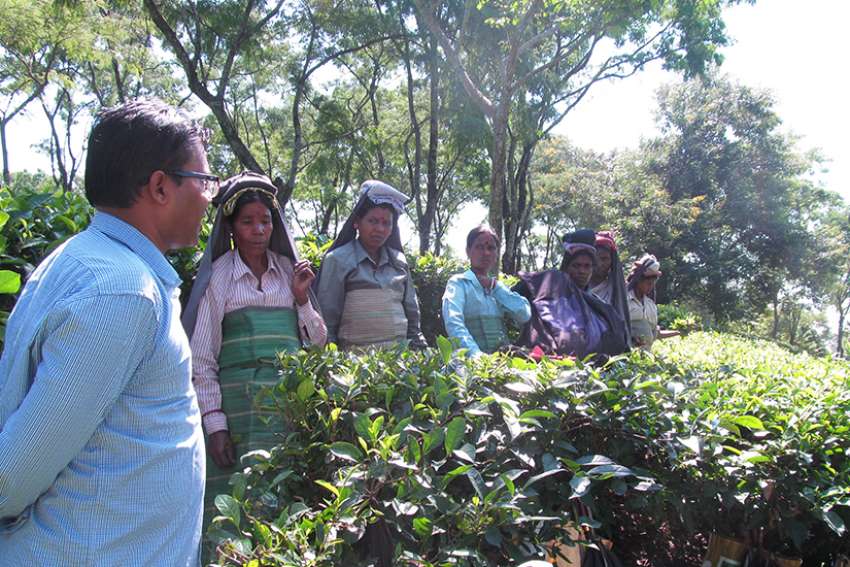Fr. Lalit speaks with women who were just informed that the darjeeling plantation will be closing down in 2015.
Photo courtesy of Fr. Lalit
Jesuit gives voice to tea workers' plight in India
By Jean Ko Din, The Catholic Register
The plight of workers on India’s tea estates will not go unnoticed by the rest of the world if Jesuit Fr. Lalit Tirkey has his way.
Tirkey has just finished a month-long visit to educate Canadians about how his mission work is supporting tea plantation workers in the Indian region of Darjeeling, where he says workers’ rights are being violated.
Tirkey is director of the Human Life Development Research Centre (HLDRC), a community development centre managed by the Jesuits in North Bengal. The centre provides advocacy seminars and leadership training to empower vulnerable groups in the tea plantations.
“This is the forgotten community,” he told a crowd of 50 people at Mary Ward Centre Nov. 28. “The backbone of this tea industry is still one of the poorest people of the society.”
About 1.13 million people live and work in the tea estates of northern West Bengal, most of which are spread across the Jalpaiguri and Darjeeling regions.
“At any given time there are about 2,000 to 3,000 people working in one tea estate,” said Tirkey, who has delivered his message at schools and parishes across the country. “The labourers are completely dependent on the estate management for work, wages, medical supplies, housing, even water and electricity.”
He said that owners of these estates have been known to say that cash wages of about 120 rupees for eight hours of work (or $2.40 Canadian dollars) are justified for what they spend on housing and medical facilities, as required by the Plantation Labour Act of 1951.
However, Tirkey said that financial mismanagement has left housing and medical facilities in shambles. “In India, I would say, there is general apathy to what happens to this sector.”
Only two permanent labourers per household are permitted to work on the estates. They can be joined by “casual labourers” who pick up work during the peak harvest months of March to September. This limits the income families are able to earn and many face starvation. Children are forced to drop out of school to earn extra money.
Because these estates are far from urban areas, there are no alternative industries to absorb job losses when a tea garden closes down.
“After over 60 years in existence, they do not own their land,” said Tirkey. “Today we call them ‘landless labourers’ and we’re appealing to the government to give them at least their homestead.”
The HLDRC was established on July 31, 2013. It began by talking with communities and establishing leaders to speak about their needs. Almost immediately, Tirkey said, people in the community flocked to meet with him and his fellow mission workers.
“There was a lot of hope in these first meetings because they have had a lot of groups come and go but we were there and I said, ‘We will be part of your lives,’ ” said Tirkey.
In four years, the HLDRC has established regular forums for community members to speak about their concerns and their priorities.
Skills development courses for English language, basic computer skills, tailoring, weaving and even livestock rearing are giving people more opportunities to find work outside the plantations.
The HLDRC also provides people with legal aid, pension plans and student scholarships.
Last year, the centre launched an anti-human trafficking campaign to educate communities after an influx of closed tea gardens left girls and women vulnerable to be lured by traffickers masquerading as “job agents.”
“To achieve the goals we have for these communities, we need to have partnerships. We have about a dozen of them,” said Tirkey. “One of the main reasons for this trip is to come and thank the people and all those who have done great work for our place.”
Tirkey’s series of presentations is part of the Canadian Jesuits International’s Tell Ten campaign, which encourages supporters to raise awareness about livelihood support for the poor.
The campaign is focused on three partner projects: Tirkey’s HLDRC centre in Darjeeling, the Kasisi Agricultural Training Centre in Zambia and Comparte social organization in Latin America.
For more information, visit www.canadianjesuitsinternational.ca.
Image Gallery
View the embedded image gallery online at:
https://www.catholicregister.org/home/international/item/26501-jesuit-gives-voice-to-tea-workers-plight-in-india#sigProIda34982d5fc
https://www.catholicregister.org/home/international/item/26501-jesuit-gives-voice-to-tea-workers-plight-in-india#sigProIda34982d5fc
Please support The Catholic Register
Unlike many media companies, The Catholic Register has never charged readers for access to the news and information on our website. We want to keep our award-winning journalism as widely available as possible. But we need your help.
For more than 125 years, The Register has been a trusted source of faith-based journalism. By making even a small donation you help ensure our future as an important voice in the Catholic Church. If you support the mission of Catholic journalism, please donate today. Thank you.
DONATE


